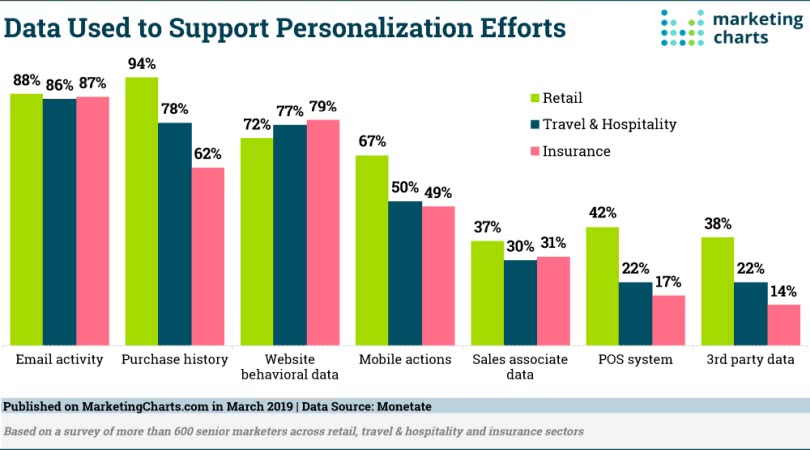Start a profitable website or blog
Free email course
by the MarbleHost Academy.
DIY: How Personalization Effects Fashion Retail Sales
If E-Commerce is the face of the fashion industry, then personalization of customer experience is perhaps the most effective skin-care routine out there. As self-proclaimed fashion connoisseurs and goodwill ambassadors, we hereby declare our duty to warn you against the casual dismissing of big data and the sheer ignorance towards tailored customization.
Today, nobody wants to walk in a store and buy the one-size-fits-all chant, only to find out that it is actually a hoax and doesn't really do justice to consumerism.
Technology is booming and with it, the entire future of E-Commerce and retail fashion stores is reshaping. Today, technology can be tailored to deliver endless customization options for increment in retail sales.
It might be a hard pill to swallow but the success of your E-Commerce fashion store depends on the preferences of your customers. Your brand's journey is dependent on your customer's loyalty and trust - personalization through big data is the only route to reach your destination.
What do Fashion Retailers Mean by "Personalization"
Artificial Intelligence (AI), a feature of cognitive technology, has helped tailor a customer's information, such as their shopping habits and preferences to deliver a personalized and highly customized shopping experience. These cognitive technology systems have been working seamlessly to offer a customer experience that is not only personalized but also highly effective in influencing engagement and interaction with the retail companies.
Personalization efforts play a pivotal role in the retail industry as illustrated in the chart below (data source: MarketingCharts):
According to Econsultancy, personalization might help to benefit at least 93% of fashion retail companies from a perspective that is not only higher in demand but also effective. Despite the success of this strategy, the report stated that only 7% of fashion retailers preferred to choose personalization as their numero uno priority while 25% of organizations opted for content management to be as their to-go strategy.
E-mails might be the quickest way to alert your customers about upcoming sales and promotions, it is nevertheless, the most ineffective way in fashion retail. Many fashion consumers might support the idea of pursuing personalization through e-mails, there is often a decrease in sales and conversion leads through search engine marketing amidst competition in the retail space.
What Can Fashion Retailers Achieve Through Personalization
Advantage Over Competition
Knowing about your customer's preferences is highly pivotal in order to bridge the influential gap between the brand and the consumer. In order to bridge to gap, it is highly essential to take specific measures for the customer's "personal care" so that they'd not only feel cared for while shopping at your retail store but also safe and valued.
Your customers are fully aware of your marketing strategies and exactly how technology can assist them in getting the most out of your fashion retail store. In order to make sure your customers know that you know, you have to plot an exclusive strategy that caters to them individually.
Today, basic recommendations have little-to-none effect on your customers - they demand targeted and sequential segmentation. This allows them to navigate easily through the various categories that are tailored specifically for them by applying filters on your page. Another strategy is to incorporate individualization in your retail fashion game so that your customers know that not only do you remember their experiences but also care about what they're going to buy next.
Customer Acquisition and Retention
According to Smart Insights, the whole world of fashion retail revolves around the customer. In order to attract and retain customers, brands have to personalize their experiences in a way that not only ensures maximum outreach but an impact that increases engagement and interaction between the two parties.
Retaining a customer is far more important than acquiring new ones - in order to sustain the loyalty of an existing customer, personalization and selective customization strategies can help brands stand out amidst competition. By offering tailored experiences, brands will learn how to deal with each customer differently, therefore, achieving a pedestal that those who deter personalization aren't on.
According to tech-savvy analyses, personalization can be considered as a more "humanized" approach and therefore, can boost a fashion retailer's revenue by 10 - 30% if they played their cards right. Mentioned below are 5 personalization strategies that will help you to deliver on-demand customized products for greater conversion leads and higher revenue.
Geo-location & Weather-based Personalization
Whether the weather is chilly with just a hint of breeze or sunny with a loud cry of humidity, incorporate a geographic weather tool to your E-Commerce retail store in order to entice customers to shop. This is a quirky marketing gimmick and allows you to tailor your promotions with respect to the sensitivities in the weather.
You can also incorporate the Geo-location targeting feature which will consequently help to deliver product search results to your customers with relevance to their location and shipping criteria. Customers don't want to waste their time on a website that sends them search alerts or promotes products that aren't available in their area. What's the whole point of browsing online if you can't have them delivered, anyway?
For instance, Shop Direct has incorporated a real-time weather prediction tool that not only shows users the products that they'd be interested in buying based on their previous experiences but also what they "would love to buy" based on the fluctuations in weather. E-Commerce pioneers like Amazon have incorporated geo-location features so that they can redirect you to a native subsidiary of their main website for the better shopping experience, shipping availability and currency feasibility.
Usage of Cookies
You might not have a sweet tooth but we all know you can't put down the cookie jar when you're bored or just need a reason to munch on something unnecessarily. Well, cookies are now a very important marketing strategy in E-Commerce - they help to tailor your experiences by remembering your past navigation details so that you're greeted by your preferred page when you return to a website.
For a better understanding, take a look at ASOS - pioneers in fashion retail and marketing - that have tailored their customers' experiences in accordance with their past purchases for the encouragement of revisits.
Product Recommendation Engine
The Product Recommendation Engine is a tool that helps fashion retail stores to choose and display hand-picked products based on your navigation details and on-site browsing history. This helps brands to curate content and deliver search results with products that are highly relevant and based primarily on your past search history.
According to a study conducted by Business Insider, this type of customized personalization might help to boost at least 10% of your brand's revenue.
Personalized E-mails & Newsletters
As mentioned earlier, e-mail retargeting is by far the most comprehensive and easiest way of luring customers back to your website. People are willing to part with data, but the main question is whether you're willing to invest in personalization strategies that are not only contextual but dynamic and productive or not. These criteria help to produce highly effective results - you can not only share real-time demographics with your customers via e-mail but can also add a personalized call-to-action (CTA) in the end to resonate with their personal experiences.
Approximately 78% of marketers prefer using your first name to contact you with product recommendations via e-mails which once again, is a basic personalization approach. Despite these basic personalization tactics, marketers fail to produce dynamic content development strategies that are interactive and highly engaging for the consumer.
In order to make prove that your products are high in demand, you have to incorporate basic e-mail personalization strategies for better engagement with your customer. Better e-mail personalization has, therefore, resulted in 17% higher conversion rates as compared to marketers who used basic and average orders via e-mails.
Discount Coupons
People shop for bargains and in order to bring them what they really desire, create a code that they can redeem upon checking out of your store. You can simply offer discounts and promotions on account of the changing seasons - similar to Offer Factor that has featured a whopping 40% on their entire spring collection in lieu of the approaching weather.
In addition to offering timed discounts, you can also derive redeemable coupon codes for your best or revisiting customers. Another way to specifically target an audience niche is to assess the data of your customers so that you'd know about the products that are high in demand. After acquiring the details, derive a coupon code that specifically targets a respective category and send alerts to customers who were interested in shopping for those products earlier.
IncStores has managed to boost their e-mail list by 300% which resulted in achieving a growth of at least 750+ subscribers every week. Dynamic text technology will, therefore, play a major role in attracting customers to your website if you use it to display product-related and category-specific promotional sales in the center.
Approximately 48% of customers rely on brands that offer a personalized shopping experience and would even prefer waiting for their desired product. As a fashion retail pioneer, you have to understand that your customers are willing to give you the data you require for a better-customized approach. Your job is to give them utmost security while ensuring that their data is not only in safe hands but also in better company.
Join MarbleHost Academy
Discover how to create a profitable website or a blog.
Join our free email course and start making money right now.





 Megan Dennis
Megan Dennis


















